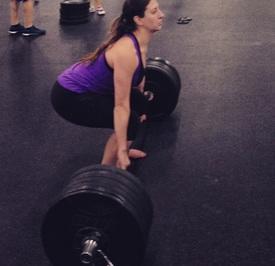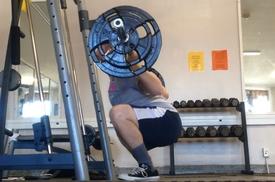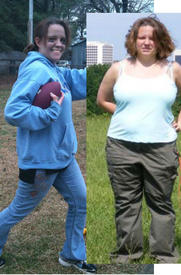OIL PULLING
Replies
-
Any coconut oil you swallow is good for you and calories should not be an issue. I have been pulling nearly a year and I purposely swallow a bit while it is still fresh because it is so healthy. Not all calories are alike; some are so good for you that you don't want to miss them.
Regardless of how healthy the oil may be, it's still pure fat and the calories you swallow do count.
Sorry, but that's just the way it goes.0 -
Ew...0
-
It would appear to lack support of it's effectiveness unless you're comparing it to a lack of dental care entirely.
http://www.sciencebasedmedicine.org/oil-pulling-your-leg/
+1
Whenever I see the word detox...I get suspicious.0 -
There are strong benefits of oil pulling. I haven't tried it yet, but I just got my cocoanut oil. The main reason I would do it, is to pull out toxins. Even though oil pulling is great for dental care, it would never be a replacement for me personally. To answer the O.P. question, I would not count the calories. You don't swallow the oil, you rinse and brush your teeth, so you don't consume the calories.
* just a note: you do not want to swallow the oil if you're oil pulling since you'd just be swallowing the toxins back in your body.0 -
Leeches and even maggots are actually effective medical tools still used today (and I mean in modern, Western, scientifically-backed medicine). Ask any medical professional about it.This has got to be one of the dumber things I've heard people do for "health".
Leeches anyone? Pm me for prices.0 -
I just want to point out that the guy advocating this in this thread is, um, missing one of his front teeth. And the rest don't look all that healthy or white, either.Haha! People are really getting a kick out of this I suppose. Coconut oil basically deep cleans, whitens and strengthens your teeth. And yes you can completely substitute it for toothpaste. Which is actually better for you. Did you know the same amount of fluoride is in 8 oz of water as is the same amount of fluoride in toothpaste that if swallowed you're supposed to call poison control?0 -
I have heard (and seen) TERRIBLE things about oil pulling.0
-
LMAOHaha! People are really getting a kick out of this I suppose. Coconut oil basically deep cleans, whitens and strengthens your teeth. And yes you can completely substitute it for toothpaste. Which is actually better for you. Did you know the same amount of fluoride is in 8 oz of water as is the same amount of fluoride in toothpaste that if swallowed you're supposed to call poison control?
What? Are you saying that if I drink 8 oz of water I should call poison control? Surely I just need more coffee. So much herp de derp derp in this thread.
You don't have to call poison control for swallowing the amount of toothpaste a normal person uses to brush teeth. You call if you, say, swallow the whole tube.0 -
LMAOHaha! People are really getting a kick out of this I suppose. Coconut oil basically deep cleans, whitens and strengthens your teeth. And yes you can completely substitute it for toothpaste. Which is actually better for you. Did you know the same amount of fluoride is in 8 oz of water as is the same amount of fluoride in toothpaste that if swallowed you're supposed to call poison control?
What? Are you saying that if I drink 8 oz of water I should call poison control? Surely I just need more coffee. So much herp de derp derp in this thread.
You don't have to call poison control for swallowing the amount of toothpaste a normal person uses to brush teeth. You call if you, say, swallow the whole tube.
Thas fer cleanin yer insides0 -
There are strong benefits of oil pulling. I haven't tried it yet, but I just got my cocoanut oil. The main reason I would do it, is to pull out toxins. Even though oil pulling is great for dental care, it would never be a replacement for me personally. To answer the O.P. question, I would not count the calories. You don't swallow the oil, you rinse and brush your teeth, so you don't consume the calories.
* just a note: you do not want to swallow the oil if you're oil pulling since you'd just be swallowing the toxins back in your body.
Can you please name these toxins, describe the impact they have on your body and then explain to the group what medical condition you have that prevents your body's natural filter system (liver, kidneys) from working correctly? Thanks.0 -
Had to weigh in on this: I worked in dentistry about 6 years - so that is my "expertise". First off - Fluoride. There are different kinds of fluoride Sodium Fluoride, found in toothpaste, mouthwash, etc will make you sick if you swallow too much. Calcium Fluoride, found in treated water will not make you sick if ingested. So your "factoid" about the amount of fluoride in water and poison control is missing key information. Second - the effectiveness of oil pulling. Putting anything viscous in your mouth will collect small amounts of debris and material that causes acid erosion and cavities, but not as efficiently as toothpaste and floss. Claims about strengthening teeth are false, the extra work might actually do some damage to the periodontal ligament that holds your teeth in, claims about pulling out "toxins" are false, claims that it is "better" than toothpaste are false. As far as the fellow who went to the dentist and is now convinced - what is your dental history? Did you have lots of problems before and now you don't have those problems? My assumption is probably not. People have different levels of a handful of bacteria types in their mouths naturally - some folks are prone to cavities and some folks are prone to tartar build up. The second group of folks can be a bit more lackadaisical about oral hygiene with fewer consequences. So at the end of the day, why not just brush and floss? It is cheaper, works faster, and has the added benefit of topical fluoride (yes, will make you sick if you swallow it, but you aren't an infant, I think you can handle it), that shrinks the pores of your teeth and makes them more impervious to bacterial infection and acid erosion (ie cavities). And for the people that are all "HA! it IS Toxic!!!" we use lots of things that would be toxic if ingested (sunscreen, soap, alcohol, which makes you feel funny because it is poison, etc), so it's not like this is the only product on the market that you should avoid swallowing.
*Note - I worked in dentistry, but I am not a dentist. Do not construe my comment as advice, merely informed opinion.
Just out of curiosity, do any dentistry schools require/offer Weston A. Price's Nutrition and Physical Degeneration (or, have you read it yet)? If not, I think it might be a worthwhile read. Price was a dentist in Cleveland, Ohio for several years, and felt that something was wrong with the rate at which he was seeing cavities in his patients. So, he spent the next several years travelling and studying indigenous populations to see how their teeth were. What he found was that the indigenous populations not only didn't have tooth and gum decay or deformation issues (ie - their wisdom teeth actually fit in their mouths), but that the rate of incidence of decay went up as their diets were Westernized.
I can't speak for the specific claims of oil pulling, but I did want to point out that coconut oil is a pretty powerful anti-microbial. Additionally, the lauric acid content is well known for it's "cleansing" properties (ie - it's what makes coconut oil based soaps so effective at cleaning, stripping away oils, and why making a pure coconut oil soap requires a very high superfat content to keep the soap from drying out the skin too severely). There's also some indication that using sesame oil can moisturize the gums and help with dry mouth (and the dental issues associated with it). Therefore, it's not much of a stretch to conclude that oil pulling with coconut oil or sesame oil might indeed have at least some beneficial effect (kills various bacteria and fungi that contribute to dental issues, in particular). Is it as good as conventional brushing? That I don't know, as I don't think there's been enough research done on it to prove one way or another.
http://gutenberg.net.au/ebooks02/0200251h.html
http://www.ncbi.nlm.nih.gov/pubmed/17651080
http://www.ncbi.nlm.nih.gov/pubmed/24328700
http://www.ncbi.nlm.nih.gov/pmc/articles/PMC3296356/0 -
There are strong benefits of oil pulling. I haven't tried it yet, but I just got my cocoanut oil. The main reason I would do it, is to pull out toxins. Even though oil pulling is great for dental care, it would never be a replacement for me personally. To answer the O.P. question, I would not count the calories. You don't swallow the oil, you rinse and brush your teeth, so you don't consume the calories.
* just a note: you do not want to swallow the oil if you're oil pulling since you'd just be swallowing the toxins back in your body.
Could you point to any studies (not anecdotal) that support your assertion that that this practice will "pull out toxins" and could you specify which "toxins" they're pulling out?0 -
This content has been removed.
-
Theres this new product out....

Im thinking of trying this as an oral cleanse. Anyone ever hear of it or try it?0 -
OMG, I still get the stomach churning, chills, and gag reflex when I come back to this thread, now 2 days later.
I think I will try the leeches instead to pull out my toxins.
For the record, TMI on swallowing. That makes me gag too, especially oil. I envision going into my kitchen, getting the oil out (granted it is not coconut oil), and taking and swishing it around for a bit (not 20 minutes though because then would have bits of food and bacteria in it) and then swallowing it. Yeah, no, not for me.0 -
I do medical transcription for a few oral surgeons, and they never once recommend to oil pull.
ETA, wonder why they call it pulling? To me it should be oil swishing (sometimes swallowing) and then oil spitting.
Oh, ETA again, pulling for the effect of supposedly pulling out toxins. I get it.0 -
OMG, I still get the stomach churning, chills, and gag reflex when I come back to this thread, now 2 days later.
I think I will try the leeches instead to pull out my toxins.
For the record, TMI on swallowing. That makes me gag too, especially oil. I envision going into my kitchen, getting the oil out (granted it is not coconut oil), and taking and swishing it around for a bit (not 20 minutes though because then would have bits of food and bacteria in it) and then swallowing it. Yeah, no, not for me.
I like doing that with carapichea ipecacuanha root extract. It works wonders.0 -
For me personally, it's the die off from Lyme Disease treatment.0
-
For the record, the original question of calories, for me, I don't think I would count them, as I would surely vomit any calories I had ingested before I pulled, so I would have to go delete anything I logged for the day anyway.0
-
My bad, I thought this had turned into a spit vs. swallow thread :blushing:0
-
i oil pull every morning, but I mostly do it because i have TMD and i find it helps to relax my jaw muscles and i have less pain when i am consistently pulling. it also does make my mouth/teeth feel great and leaves my tongue a great color and helps my breath, so to each their own.0
-
i oil pull every morning, but I mostly do it because i have TMD and i find it helps to relax my jaw muscles and i have less pain when i am consistently pulling. it also does make my mouth/teeth feel great and leaves my tongue a great color and helps my breath, so to each their own.
Hey. Can you tell, I am really having hard time with this?
Anywho, how does swishing oil help with breath? I would think it would leave an oily smell, no?
Also, if it is for TMD, wouldn't some warm water do the same thing, help jaw relax, etc. What color is your tongue afterwards?0 -
Theres this new product out....

Im thinking of trying this as an oral cleanse. Anyone ever hear of it or try it?
HA...oral.0 -
Surprisingly (to me, at least), coconut oil has no odor at all. I don't "oil pull" or whatever, but I've been having issues with dry hair and started using coconut oil on it to try to fix that and it has no scent at all. And I have a VERY sensitive nose. So it probably doesn't give off an oily breath smell, though I don't know if it covers or corrects breath that is bad for other reasons.i oil pull every morning, but I mostly do it because i have TMD and i find it helps to relax my jaw muscles and i have less pain when i am consistently pulling. it also does make my mouth/teeth feel great and leaves my tongue a great color and helps my breath, so to each their own.
Hey. Can you tell, I am really having hard time with this?
Anywho, how does swishing oil help with breath? I would think it would leave an oily smell, no?
Also, if it is for TMD, wouldn't some warm water do the same thing, help jaw relax, etc. What color is your tongue afterwards?0 -
I believe it's called oil pulling because of the act of "pulling" the oil through your teeth. Or rather, the spaces between your teeth.I do medical transcription for a few oral surgeons, and they never once recommend to oil pull.
ETA, wonder why they call it pulling? To me it should be oil swishing (sometimes swallowing) and then oil spitting.
Oh, ETA again, pulling for the effect of supposedly pulling out toxins. I get it. 0
0 -
I do it every morning, I do not super high expectations but it really makes my teeth feel clean. I then rinse with salt water, brush my teeth, and rinse with salt water. No I do not count it as calories.0
-
Serious research has indicated that oil pulling is effective because it takes your mouth to a level of cleanliness that we don't necessarily experience from daily brushing. Your mouth is a gateway into your digestive system and blood stream and nasal passages, etc, so the healthier it is, the healthier the areas of the body directly connected to it will be. Oil pulling does not "pull toxins," but rather just provides a very healthy mouth which can directly affect other areas of your body.0
-
Serious research has indicated that oil pulling is effective because it takes your mouth to a level of cleanliness that we don't necessarily experience from daily brushing. Your mouth is a gateway into your digestive system and blood stream and nasal passages, etc, so the healthier it is, the healthier the areas of the body directly connected to it will be. Oil pulling does not "pull toxins," but rather just provides a very healthy mouth which can directly affect other areas of your body.
Care to link to the "serious research" of which you speak?0 -
http://www.google.com/url?sa=t&rct=j&q=&esrc=s&source=web&cd=8&sqi=2&ved=0CGkQFjAH&url=http://www.researchgate.net/publication/228617444_Effect_of_oil_pulling_on_plaque_and_gingivitis/file/60b7d514d29faa8d58.pdf&ei=FKqEU_L8CYSwyATH3oCQBg&usg=AFQjCNEkRPZCkwOt2w2a7Fgy4qPQPz6FLA&sig2=KIB0V-aJhrWFnNFdbnKiaQ
That is a download link for an actual paper
And this article: Skip to the interview with Dr. Sanda Moldovan where she describes how oil pulling is not a magic cure all but does have benefits because of it's oral cleaning ability:
http://jezebel.com/the-oil-pulling-health-craze-works-just-not-in-the-w-1538252677
My point is, it is not this toxin pulling magic practice that cures ailments, but does have oral health benefits.0 -
Had to weigh in on this: I worked in dentistry about 6 years - so that is my "expertise". First off - Fluoride. There are different kinds of fluoride Sodium Fluoride, found in toothpaste, mouthwash, etc will make you sick if you swallow too much. Calcium Fluoride, found in treated water will not make you sick if ingested. So your "factoid" about the amount of fluoride in water and poison control is missing key information. Second - the effectiveness of oil pulling. Putting anything viscous in your mouth will collect small amounts of debris and material that causes acid erosion and cavities, but not as efficiently as toothpaste and floss. Claims about strengthening teeth are false, the extra work might actually do some damage to the periodontal ligament that holds your teeth in, claims about pulling out "toxins" are false, claims that it is "better" than toothpaste are false. As far as the fellow who went to the dentist and is now convinced - what is your dental history? Did you have lots of problems before and now you don't have those problems? My assumption is probably not. People have different levels of a handful of bacteria types in their mouths naturally - some folks are prone to cavities and some folks are prone to tartar build up. The second group of folks can be a bit more lackadaisical about oral hygiene with fewer consequences. So at the end of the day, why not just brush and floss? It is cheaper, works faster, and has the added benefit of topical fluoride (yes, will make you sick if you swallow it, but you aren't an infant, I think you can handle it), that shrinks the pores of your teeth and makes them more impervious to bacterial infection and acid erosion (ie cavities). And for the people that are all "HA! it IS Toxic!!!" we use lots of things that would be toxic if ingested (sunscreen, soap, alcohol, which makes you feel funny because it is poison, etc), so it's not like this is the only product on the market that you should avoid swallowing.
*Note - I worked in dentistry, but I am not a dentist. Do not construe my comment as advice, merely informed opinion.
Just out of curiosity, do any dentistry schools require/offer Weston A. Price's Nutrition and Physical Degeneration (or, have you read it yet)? If not, I think it might be a worthwhile read. Price was a dentist in Cleveland, Ohio for several years, and felt that something was wrong with the rate at which he was seeing cavities in his patients. So, he spent the next several years travelling and studying indigenous populations to see how their teeth were. What he found was that the indigenous populations not only didn't have tooth and gum decay or deformation issues (ie - their wisdom teeth actually fit in their mouths), but that the rate of incidence of decay went up as their diets were Westernized.
I can't speak for the specific claims of oil pulling, but I did want to point out that coconut oil is a pretty powerful anti-microbial. Additionally, the lauric acid content is well known for it's "cleansing" properties (ie - it's what makes coconut oil based soaps so effective at cleaning, stripping away oils, and why making a pure coconut oil soap requires a very high superfat content to keep the soap from drying out the skin too severely). There's also some indication that using sesame oil can moisturize the gums and help with dry mouth (and the dental issues associated with it). Therefore, it's not much of a stretch to conclude that oil pulling with coconut oil or sesame oil might indeed have at least some beneficial effect (kills various bacteria and fungi that contribute to dental issues, in particular). Is it as good as conventional brushing? That I don't know, as I don't think there's been enough research done on it to prove one way or another.
http://gutenberg.net.au/ebooks02/0200251h.html
http://www.ncbi.nlm.nih.gov/pubmed/17651080
http://www.ncbi.nlm.nih.gov/pubmed/24328700
http://www.ncbi.nlm.nih.gov/pmc/articles/PMC3296356/
He probably should have saved himself some time and just done a Google search. I found this in 5 seconds. Then again, I don't have a book to sell...
http://www.healthinfonet.ecu.edu.au/uploads/docs/oral-health-pl-review.pdf
Indigenous adults aged 35-54 years were five times more likely to have lost all of their teeth than non-Indigenous
adults of the same age (Figure 8). The proportions were similar for
Indigenous and non-Indigenous adults 75 years and older.
What other oral health problems do Indigenous people experience?
Some oral health problems are not as easy to identify as caries and
periodontal diseases The NSAOH found that [11]:
• Indigenous adults were almost twice as likely as non-Indigenous adults to have had a toothache in the year before
the survey was conducted.
• Indigenous adults were twice as likely as non-Indigenous adults to report avoiding food because of oral health problems.
Oral health problems can cause people to avoid certain kinds of food that might be difficult to eat (for example, someone
who has lost most of their teeth may not be able to eat steak); this can reduce a person’s enjoyment of food and may also
make it difficult for them to have a balanced diet.
• Indigenous adults were one-and-a-half times more likely than non-Indigenous adults to rate their oral health as ‘fair’ or ‘poor’
(the two lowest measures).
Please tell me that you do know that Weston Price died some 40 years before the Internet was even in its infancy (and nearly a decade before the first of the Google founders was even born)...
Also, your very own paper states this:Diet - caries can mostly be prevented by having a healthy diet
[7]. The traditional diet of many Indigenous people included a
lot of fibre and protein and was low in sugar. Traditional bush
foods generally required a lot chewing which increased the
amount saliva (spit) that was produced and helped keep teeth
clean [9]. By comparison, the modern diet of many Indigenous
people includes a lot of processed and sugary foods that
increase the risk of developing caries [7][9].
And this:Tooth brushing - tooth brushing with fluoridated toothpaste
everyday is essential for good oral health. Evidence suggests
that oral care was not necessary with a traditional Indigenous
diet, for reasons given above, and was not part of all Indigenous
cultures [7]. People who are less well off are less likely to brush
their teeth and floss everyday [7][11].
Falls right in line with what Price found -- indigenous people eating their traditional diet had better dental health and that the introduction of the Western diet greatly increased the incidence of dental issues.
Other early explorers (written about by Arnold de Vries in Primitive Man and his Food in 1952) found the same things in the native Australian population -- when eating their traditional diets, their teeth were healthy and strong (as was the rest of their body).
http://www.westonaprice.org/health-topics/australian-aborigines-living-off-the-fat-of-the-land/0
This discussion has been closed.
Categories
- All Categories
- 1.4M Health, Wellness and Goals
- 397.1K Introduce Yourself
- 44.2K Getting Started
- 260.9K Health and Weight Loss
- 176.3K Food and Nutrition
- 47.6K Recipes
- 232.8K Fitness and Exercise
- 457 Sleep, Mindfulness and Overall Wellness
- 6.5K Goal: Maintaining Weight
- 8.7K Goal: Gaining Weight and Body Building
- 153.4K Motivation and Support
- 8.3K Challenges
- 1.3K Debate Club
- 96.5K Chit-Chat
- 2.6K Fun and Games
- 4.6K MyFitnessPal Information
- 16 News and Announcements
- 18 MyFitnessPal Academy
- 1.4K Feature Suggestions and Ideas
- 3.1K MyFitnessPal Tech Support Questions















